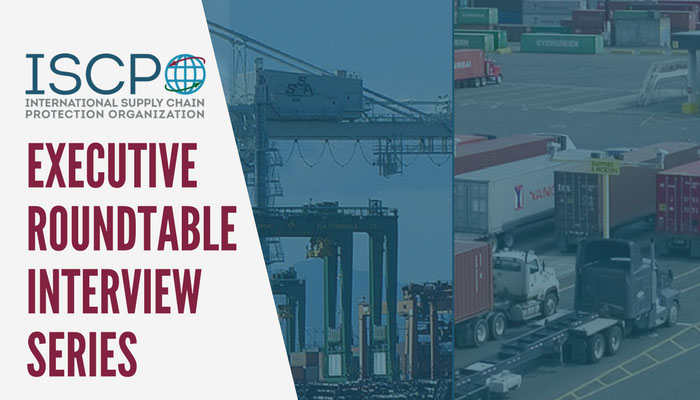As part of our Executive Roundtable Interview Series, we sat down with prominent law enforcement veteran John Cannon, Special Agent in Charge (SAC) of the GBI Major Theft Unit with the Georgia Bureau of Investigation (GBI). An active ISCPO board member, he provides a unique perspective when it comes to setting best practices in conducting major theft investigations. We asked him to share his take on where the industry is going in combating crime and how LP practitioners can effectively work with law enforcement to mitigate loss.
SAC Cannon’s unit is responsible for cargo theft investigations in the state of Georgia.  With over 40 years of Law Enforcement experience, SAC Cannon has worked in a variety of roles at the GBI including serving at the Democratic National Convention, the Olympic Games in Atlanta, the G-8 Summit at Sea Island. He was also a member of the GBI Special Response Team as well as the State of Georgia Special Weapons and Tactics Team. SAC Cannon has twice received the GBI Directors Award for investigative excellence during his career, along with the GBI Meritorious Service Award and the Medal of Valor from the International Narcotic Enforcement Officers Association. SAC Cannon graduated from Columbus State University with a Bachelor of Science degree in Criminal Justice. He is a graduate of the Georgia Association of Chiefs of Police Law Enforcement Command College and the Professional Management Program at Columbus State University. He is a Senior Instructor at the Georgia Public Safety Training Center, where he instructs on topics regarding drug investigations and cargo theft.
With over 40 years of Law Enforcement experience, SAC Cannon has worked in a variety of roles at the GBI including serving at the Democratic National Convention, the Olympic Games in Atlanta, the G-8 Summit at Sea Island. He was also a member of the GBI Special Response Team as well as the State of Georgia Special Weapons and Tactics Team. SAC Cannon has twice received the GBI Directors Award for investigative excellence during his career, along with the GBI Meritorious Service Award and the Medal of Valor from the International Narcotic Enforcement Officers Association. SAC Cannon graduated from Columbus State University with a Bachelor of Science degree in Criminal Justice. He is a graduate of the Georgia Association of Chiefs of Police Law Enforcement Command College and the Professional Management Program at Columbus State University. He is a Senior Instructor at the Georgia Public Safety Training Center, where he instructs on topics regarding drug investigations and cargo theft.
ISCPO: How has the industry evolved since you started out, especially related to how technology aids in investigations?
I think the use of technology has increased, especially with high value loads. When tracking devices are utilized by the transportation industry and used correctly, it provides us with a greater opportunity to recover a stolen load. Real time monitoring and timely notification improves the chance of making a full recovery. As with any organized criminals who adjust to investigative techniques, cargo thieves have responded to the use of technology utilized by the transportation industry. On the flip-side. we have seen an increase in the use of GPS jamming devices being used by the organized cargo theft groups, especially the groups from South Florida.
ISCPO: Why did you participate on the ISCPO board?
One of the main pieces of the strategy that we developed to combat cargo theft was to develop relationships with the private sector. I think by being on the board will help facilitate that objective. It will provide a law enforcement perspective on any discussions that occur concerning security procedures and protocol developed by the private sector. I think it is important to have someone with a Law Enforcement background on the board to provide a LE prospective. Also I think it will help the private sector understand what Law Enforcement needs when conducting an investigation.
ISCPO: In your experience, how can Public Sector & Law Enforcement can work together with Private Sector better?
Prior to my assignment regarding cargo theft, I spent most of my career in drug enforcement with the GBI. Initially it was difficult for me to understand the concept of sharing information with the private sector. I quickly realized the importance and benefit of working together with private sector investigators. While it may sound easy, it takes time to develop that level of trust to share information. It is also important for private sector investigators to understand that we cannot share certain information with them. It is also important for the private sector to have and provide to us in a timely manner information regarding the particulars of a theft. The first moments after the theft are critical to the recovery of the stolen cargo. If the private sector can provide us with timely information the chances of a recovery increase. In more sophisticated theft situations, the hand off between an internal LP investigation and Law Enforcement is sometimes a grey area. That’s when it’s even more critical for LP managers to communicate to Law Enforcement they’re tracking potential insider-generated crime. For example, it could take weeks for one investigation to uncover where several touch points are redirecting or stealing cargo from targeted vulnerable environments. Once scanning data or evidence is collected, a fully documented file can be handed over to Law Enforcement, be it local, state or national level.
ISCPO: As a Public Sector official who’s investigated numerous supply chain crimes, what are the three most important elements a company moving goods must do to maintain a high standard of protection?
I get this question asked time and again. It’s really the first question every loss protection professional should ask themselves, and continuously revisit quarterly. Focusing on a few key things will keep your eye on what’s your and your business’s priority. Here’s a checklist to start your own strategic plan to stay ahead of crime, never alone reacting to it.
Stay Current with:
- Cargo theft intelligence and trends – there are many products and solutions to track, monitor, and recover goods
- Training
- Avoid complacency
Conduct Threat Assessments:
- Probe looking for vulnerability of protocols and plans
- Properly vet security companies and Temporary employees
- Properly plan for worst case scenarios
Employ Best Practices:
- Situational awareness
- Supply chain collaboration
- Secure chain of custody utilizing best of class covert GPS devices
- Monitor the movement of cargo
- Follow protocols
- Strict carrier vetting and accreditation like the ISCPO Carrier Audit & Certification Program
ISCPO: What are the biggest challenges to supply chain protection & security, from a holistic industry level?
Cyber-Crime – We’re seeing cyber-crimes and the efforts to preventing those crimes continuously growing. Companies must take protecting their technology systems and data seriously and not rely on IT departments to do the job. Specially training professionals with technological knowledge should develop LP programs and devise risk management protocols that adhere to the law.
Limited Background Checks – Supply chain in itself connects a multitude of products, companies, and people together to move goods from A to B. Organizations must know who’s handling their goods at all times. Companies not committed to conducting routine and organized background checks are weakening the supply chain as a whole, using the addage you’re only as strong as your weakest link.
As the speed of the Industry increases so will the theft – With the increase of eCommerce and global shipments, there are significantly more goods in transit than ever before. As with any variable cost, private sector leaders need to understand that risk management budgets need to match the increased pace of business.


